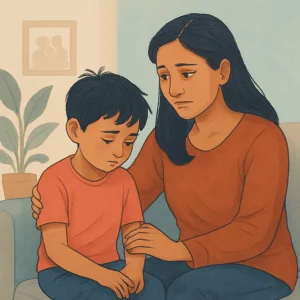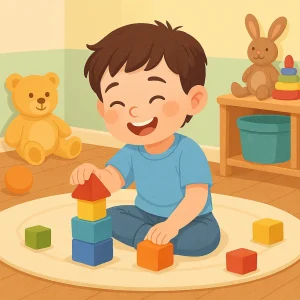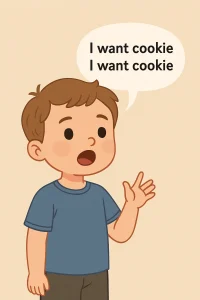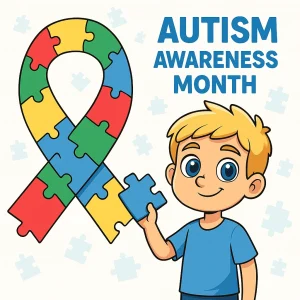Is Your Child a Late Talker or Showing Signs of Autism?
Last Updated: April 12, 2025
Is your toddler not talking as much as other kids their age? You’re not alone—and it’s completely natural to feel concerned. For many parents, it’s hard to know whether delayed speech is part of normal development or an early sign of something more, like autism. This guide will help you understand the key differences between late talkers and children showing early signs of autism. You’ll learn what’s typical, what’s not, and when it’s time to seek professional help.
With early intervention, the right support can make a big difference. Let’s explore how to recognize speech delays, decode your child’s behaviors, and take action—whether they just need time or specialized online speech therapy.
Understanding Late Talkers
Who Are Late Talkers?
Late talkers are children who experience a delay in the development of their expressive language skills. Typically, these are toddlers who have mastered understanding language and other non-verbal communication forms but start speaking words and forming sentences later than their peers. The basic characteristics of late talkers include having a limited vocabulary for their age, using fewer words to communicate, and sometimes showing frustration when trying to express themselves.
Typical Age and Developmental Milestones:
Late talkers are usually identified between the ages of 18 and 30 months when parents or caregivers notice that the child isn’t meeting language milestones. For instance, by 18 months, most children can say at least several single words, and by age two, they start combining words into short phrases. Late talkers might still be using single words or very simple phrases by their second birthday.
Common Reasons for Late Talking
Non-autistic Reasons for Delayed Speech
There are many reasons why a child may talk later than usual, and not all are linked to autism. Some common non-autistic causes include:
- Hearing Impairments: Even mild hearing loss can affect how a child picks up language from their environment.
- Oral Impairments: Issues like oral-motor delays, where a child has difficulty coordinating the mouth muscles to produce speech.
- Family History and Genetics: Children with family members who were late talkers are more likely to be late talkers themselves.
- Boys are More Likely to be Late Talkers: Research suggests that boys are more prone to delays in speech and language development than girls.
Impact of Environmental Factors
The environment a child grows up in plays a crucial role in their speech and language development. Factors that can impact this include:
- Parental Interaction: Children need rich language input from their parents or caregivers. Limited interaction can slow language development.
- Socioeconomic Factors: These can influence the amount and quality of language a child is exposed to daily.
- Bilingual Environments: Sometimes, children raised in bilingual homes may start speaking a bit later as they are learning two languages simultaneously. However, this is usually a temporary delay.
Recognizing Signs of Autism
Early Signs of Autism Related to Speech
Autism Spectrum Disorder (ASD) presents a range of signs that can be noticed early in a child’s development, many of which involve speech and language delays or differences. Recognizing these early can help ensure that children receive the support they need to thrive.
Key Speech Delay Symptoms Typical in Autistic Children:
- Delayed Speech Development: Unlike late talkers who catch up naturally, autistic children may not only speak later but also differently.
- Echolalia: This is the repetition of phrases or noises without a clear understanding or purpose.
- Limited Range of Tones: Autistic children might use a very monotone voice, lacking the usual ups and downs that convey different meanings or emotions in speech.
Differences in Social Communication Skills:
- Lack of Gestures: Autistic children may not use common gestures such as pointing or waving goodbye to communicate, which are typically developed in early toddler years.
- Poor Eye Contact: They might struggle with making or maintaining eye contact during interactions.
- Difficulty in Using Language Socially: Understanding the pragmatic use of language, like greetings, farewells, and requests, can be challenging for children with autism.
Broader Autism Symptoms to Be Aware Of
Autism also involves various non-speech-related symptoms that can provide early indications of the condition. Recognizing these broader symptoms is crucial as they often persist beyond language development.
- Behavioral Signs:
- Repetitive Behaviors: Engaging in repetitive motions such as rocking, spinning, or hand-flapping.
- Strict Adherence to Routine: Excessive distress at small changes, strict routines, or rituals.
- Social Interaction Challenges:
- Lack of Interest in Peers: Little to no interest in interacting with other children.
- Unusual Responses to Sensory Input: Over- or under-sensitivities to sounds, lights, touch, tastes, or smells, which can appear as indifference or extreme responses to sensory stimuli.
- Cognitive and Emotional Signs:
- Difficulty with Emotional Regulation: Extreme responses to seemingly minor issues, difficulty calming down.
- Unusual Play Patterns: Limited pretend play, unusually focused interests on specific objects or subjects.
Comparing Late Talkers and Autism
Understanding How Autism Differs from Simple Speech Delays:
- Nature of Disorder: Autism is a developmental disorder impacting social skills, communication, and behavior. Speech delays in autism are often part of broader communication and behavioral issues.
- Signs Beyond Speech: Children with autism typically show difficulties with nonverbal communication (e.g., eye contact, understanding gestures) not present in late talkers.
- Progression: Children with simple speech delays often catch up naturally, unlike those with autism who may need targeted intervention across multiple areas.
Role of Speech Therapy in Distinguishing Between the Two:
- For Late Talkers: Focuses on enhancing language skills, using exercises to improve vocabulary, sentence structure, and conversational skills.
- For Children with Autism: Involves broader goals such as improving verbal and non-verbal communication, using specialized approaches like PECS or social skills training alongside speech therapy.
- Assessment and Personalization: Speech therapists at wellness hub evaluate each child’s needs to determine the best approach, ensuring personalized and effective treatment.
- Early Intervention: Crucial for both late talkers and children with autism, early diagnosis, and tailored interventions lead to the best outcomes.
Still unsure if it’s just a speech delay or something more? Explore our online speech therapy for kids and get expert guidance tailored to your child’s needs — wherever you are
When to Seek Help
Recognizing when to seek professional help for your child’s speech and language development is crucial. Early intervention can significantly impact their communication skills and overall development. Here’s what you need to know about consulting with experts and what to expect during evaluations.
Consulting With Experts
The Role of Speech-Language Pathologists from Wellness Hub:
- Expert Guidance: Our speech-language pathologists (SLPs) are trained professionals specializing in diagnosing and treating communication disorders. They play a crucial role in assessing speech delays and developmental concerns.
- Customized Strategies: Based on individual assessments, our SLPs design targeted therapy plans that cater to the specific needs of each child, focusing on enhancing both their speech and overall communication abilities.
When and How to Seek Professional Evaluations:
- When to Seek Help: If your child is not meeting typical developmental milestones for speaking or if you notice unusual patterns in their communication or social interactions, it’s time to consult an expert.
- How to Proceed: Contact Wellness Hub to schedule an evaluation. Early consultation can lead to better outcomes by addressing issues before they become more pronounced.
What to Expect in an Evaluation
What Happens During a Speech and Developmental Evaluation?
- Comprehensive Assessment: The evaluation process typically involves detailed observations and standardized testing to assess your child’s speech, language, and overall communication skills.
- Parental Involvement: You may be asked to provide information about your child’s developmental history and any concerns you have observed. Parent insights are invaluable in forming a comprehensive understanding of the child’s abilities.
How Experts at Wellness Hub Can Guide Through the Process:
- Personalized Attention: Each child receives individual attention from our experts, ensuring that the assessment is thorough and tailored to their specific needs.
- Follow-Up Plan: After the evaluation, our SLPs will discuss the results with you, suggest next steps, and propose a therapy plan if needed. This plan may include sessions at our clinic, activities to do at home, or both.
If your child isn’t meeting speech milestones, don’t wait.. Book an online speech therapy session with our licensed professionals today — early support makes all the difference.
Supporting Your Child at Home
Helping your child develop strong speech and communication skills can be achieved effectively at home with the right strategies and understanding. Whether your child is a late talker or has been diagnosed with autism, there are specific approaches you can adopt to support their development. Here’s how you can help:
Tips for Parents of Late Talkers
Encouraging speech development for late talkers involves engaging activities and consistent interaction. Here are practical tips to enhance speech at home:
- Daily Reading Sessions: Regularly read to your child to expose them to language and new vocabulary. Point to pictures and pronounce words clearly to help them associate objects with words.
- Sing Songs and Nursery Rhymes: These are excellent tools for learning rhythm, speech patterns, and vocabulary. Singing also makes learning fun and engaging.
- Use Simple Language: When talking to your child, use short and simple sentences. This makes it easier for them to understand and mimic your speech.
- Encourage Imitation: Repeat sounds and simple words to encourage your child to imitate you. Celebrate and positively reinforce any attempts they make to speak.
- Interactive Play: Engage in play activities that require your child to communicate their needs. For example, play with toys that involve taking turns or choosing colors and shapes.
Intervention Strategies for Autism
Early intervention is crucial for children with autism, involving structured strategies tailored to each child’s needs. Here’s an overview of autism-specific strategies:
- Structured Learning Environment: Create a predictable environment where your child can thrive. Use visual schedules or timers to help them understand what activity comes next.
- Communication Aids: Depending on their needs, introduce tools such as picture exchange communication systems (PECS) or tech-based aids like tablets with speech-generating apps.
- Behavioral Therapies: Engage in therapies that reinforce positive behaviors. Applied Behavior Analysis (ABA) is a popular approach that helps increase language and communication skills.
- Social Skills Training: This involves role-playing or using social stories to help your child understand and practice appropriate social interactions.
- Sensory Integration Activities: Many children with autism are sensitive to sensory input. Incorporate activities that help them manage sensory sensitivities, such as sensory bins or noise-cancelling headphones during noisy events.
Conclusion
Understanding your child’s speech and communication development is crucial. Early diagnosis and intervention can significantly improve their ability to interact with the world. At Wellness Hub, we’re here to help with expert advice and tailored support. Explore our home therapy resources and support services, designed to empower you and your child on this journey. Together, we can build a strong foundation for your child’s future, enhancing their communication skills and overall development. Start exploring today and ensure your child gets the best start in life with Wellness Hub.
Frequently Asked Questions:
1. What is the difference between a late talker and autism?
Late talkers typically catch up with their peers naturally, often only showing delays in speech. Autism affects more areas, including social skills and behaviors.
2. At what age should I be concerned about my child’s speech?
Concerns usually arise if a child isn’t saying single words by 16 months or using phrases by 24 months.
3. How can I tell if my child is just a late talker or if it’s something more?
If your child shows signs like poor eye contact, limited gestures, or struggles with understanding simple instructions, it might be more than late talking.
4. What are the early signs of autism in toddlers?
Early signs include lack of eye contact, limited pointing or gestures, and delayed speech development.
5. How does speech therapy help children with autism?
Speech therapy can help improve both verbal skills and non-verbal communication, enhancing their ability to interact socially.
6. Can a speech delay indicate autism?
While speech delays are common in children with autism, not all children with speech delays have autism. Other signs must also be present.
7. What activities can help improve my late talker’s speech at home?
Engaging your child in daily reading, singing, and interactive play can significantly help in improving their speech.
8. When should I seek a professional evaluation for my child’s speech?
Seek evaluation if your child is not meeting speech development milestones or if you notice other developmental concerns.
9. What happens during a speech and language evaluation?
A professional will assess your child’s speech, language, comprehension, and social communication through observation and standardized tests.
10. How can I support my child with autism in their speech development?
Utilize strategies like visual supports, consistent routines, and speech therapy exercises tailored for autism to support their development.
About the Author:
Shravanaveena Gajula
M.Sc ., Speech and Language Pathology (5+ years of experience)
Shravanaveena Gajula is a dedicated Audiologist and Speech-Language Pathologist with a BASLP and an M.Sc in Speech and Language Pathology. With experience spanning multiple settings, including Wellness Hub and Ashray Akruti, Veena specializes in a wide range of disorders from developmental issues in children to speech and language assessments in adults. Her expertise includes parent counseling, managing speech sound and fluency disorders, and creating individualized therapy programs. Veena is also PROMPT certified and an author of several insightful blogs on speech and language pathology, aiming to educate and assist caregivers in supporting their loved ones.
Book your Free Consultation Today
Parent/Caregiver Info:
Client’s Details:
* Error Message








